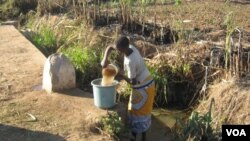Malawi is battling a cholera outbreak that began at the start of the rainy season in November. The disease has killed four people, and more than 150 others are hospitalized.
The disease — an acute diarrheal infection caused by consuming contaminated food or water — affects children and adults, and can kill within hours if left untreated.
The hardest-hit districts are Nkhatabay and Karonga, on the shores of Lake Malawi.
"As of today, we have 137 cases which we have registered from Karonga only," said Joshua Malango, spokesperson for the Ministry of Health. "And unlike Karonga, in Nkhatabay we have 16 cases as of today, with no deaths. While in Karonga we had three deaths."
The Kasungu and Dowa districts have registered one case each, while on Tuesday, medical workers confirmed two cases in the capital, Lilongwe.
The outbreak is believed to have been triggered by poor hygiene among residents, especially in Karonga.
According to Karonga-based journalist Special Absalom, more than 70 percent of people there use untreated water.
"People who are along the lakeshore area use water directly from the lake, while others who are close to the rivers, they are using water from the rivers and some are even using wells," Absalom said.
In neighboring Zambia, the disease has killed about 40 people in the capital, Lusaka, and affected more than 1,500 others since September.
However, Malawians bordering Zambia should not panic over the Lusaka outbreak, Malango says.
"We are not that close with Lusaka. But we are not taking it lightly. We are putting measures to ensure that people traveling in and out of the country, they must have proper surveillance, we have checked them to ensure that Malawians are safe," he said.
Meanwhile, Malawi's government has embarked on a nationwide campaign to remind people to wash their hands with soap, especially after using the toilet and before eating any food.
More importantly, Malango says, the government is distributing chlorine and other chemicals to treat drinking water.
Malawi suffered its worst cholera outbreak in 2009, when 82 people died and more than 3,000 people were infected across the country.
